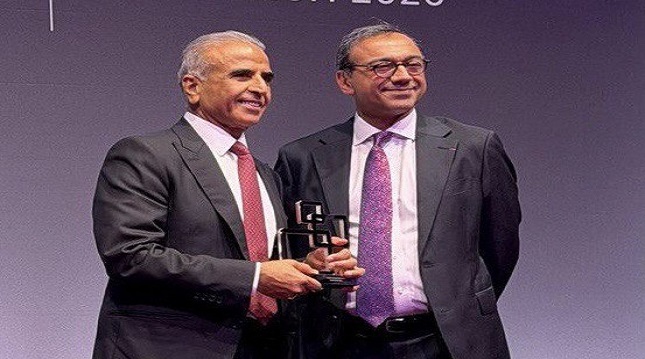Telecom
Telcos May Block Skype, WhatsApp Calls over Haemorrhaging Revenue

With the economic crisis in the country hitting businesses hard, telecommunication firms are opting for drastic measures to boost revenue, including moves that may block subscribers from accessing Skype and other Over-the-Top services, according to the Punch.
Telecoms companies in the country are hoping to address concerns over revenue loss from international calls and hit a revenue target of N20 trilion.
Pucnh gathered that subscribers might also be prevented from performing certain functions like voice and video calls on WhatsApp and Facebook, among other OTT services.
Skype is a proprietary Voice-over Internet Protocol software for calling other people on their computers or mobile phones.
Phone calls using the Skype software can be placed to recipients on the traditional telephone networks; and calls to other users within the Skype service are free-of-charge, while calls to landline phones though reasonably priced, are charged via a debit-based user account system.
“It is an aggressive approach to stop further revenue loss to OTT players on international calls, having already lost about N100tn between 2012 and 2017,” a manager at one of the major telecos in the country said.
Speaking on the condition of anonymity, the manager said, “If we fail to be pro-active by taking cogent steps now, then there are indications that we may lose between N20tn and N30tn, or so, by the end of 2018.”
The source added that the increasing rise of the OTT players, who provide voice and Short Message Services, or apps such as WhatsApp, Skype, Facebook, BlackBerry Messenger and Viber, was eating deep into the voice revenue of telecommunications companies in the country by more than 50 per cent.
A United Kingdom-based research and analytics company, Ovum, stated in a report recently that $386bn loss would accrue over a period of six years – between 2012 and 2018 – from Nigerian customers using the OTT voice applications.
“Generally, the main fear of the telecoms operators here will be that customers will increasingly use Skype as a substitute for conventional international calls,” the Principal Analyst at Informa Telecoms and Media, Matthew Reed, said.
Telecoms operators in the country said that international calls made up a critical part of their revenue because of Nigeria’s large expatriate and Diaspora population.
The apprehension over shift from voice call, according to them, is worsened by the steep decline in voice revenue.
The operators stated that at the start, they were looking to offset the fallout of intense competition by closing gaps that were spurring revenue leakage in the business.
They blamed the Nigerian Communications Commission for not properly regulating the sector in order to protect and keep them in business.
But reacting to the development, Mr. Tony Ojobo, Director, Public Affairs, NCC said, “We don’t have any evidence of that. We do not regulate the Internet.”
Mr. Kenneth Omeruo, Managing Director, TechTrends Nigeria said, “I am not aware of this development but globally, operators and network equipment makers don’t really embrace Skype.
“They liken Skype to an individual who takes undue advantage of other people’s generosity without giving anything in return. Globally, there is this apprehension among telecoms operators that Skype only steals their customers, while they invest billions of dollars to build, expand and upgrade networks.”
Major operators in the country’s $38bn telecoms market such as MTN, Globacom, Airtel and Etisalat said if the NCC failed to take decisive actions, they would keep struggling to counter a trend in which the prices of basic voice and data services were declining.
For instance, MTN Nigeria said that the OTT content services had a “cannibalising effect” on network operators’ voice and data revenue, because they provide “free” services, which duplicate those already provided by network operators such as voice calls and the SMS.
According to the firm, a ready example is WhatsApp, which provides free instant messaging services as an alternative to text messaging services provided by mobile network operators.
“It (WhatsApp) has also launched a free voice service,” the Public Relations and Protocol Manager, MTN Nigeria, Mr. Funso Aina, said, adding, “The point to note in this argument is that the OTTs allow users to send unlimited texts, images, video and audio messages free of charge, using their current data plans.”
According to him, the problem is that these services are provided using network infrastructure of the operators, but without commensurate compensation to operators.
Aina added, “At the same time, they are denying operators of revenue to grow their networks, thereby impacting on service delivery and long-term sustainability.
“For instance, to date, MTN has invested over $15bn in building its network in Nigeria. You can now imagine an OTT leveraging the network to deliver its content without investing a kobo locally. The impact on revenue is huge.
“Furthermore, because these entities are not licensed, and because they have not built any infrastructure locally, they do not have the same costs as the licensed operators.
“They do not pay taxes, they do not employ any people locally, and indeed, they have no local presence whatsoever, meaning they do not make any contribution to our economy and their services are denying those who make contributions of income.”
The MTN public relations manager stated that it was the view held by most within the industry, but noted that “at MTN, we are looking to find win-win solutions for all stakeholders.”
Aina, however, dismissed the allegation that some telecoms operators had continued to dispute a view that they were making enough money from their higher paying data services to offset the loss of voice and messaging revenues.
He explained, “Every service is provided at a cost, and we cannot subsidise one service through revenue from another; so, the argument as to whether loss of revenue from one is being offset by another is really not a fruitful argument.
“The important thing is that services must be produced efficiently and all stakeholders, including our customers, must get fair value for their investments.”
Checks by The PUNCH showed that in the United Arab Emirate, Etisalat and Du had recently lifted a ban on Skype services. Both telecoms companies had announced that their subscribers could now download the application online and make Skype-to-landline or mobile calls, which were not previously permitted.
Many telecoms operators worldwide, including some companies in the United States, the United Kingdom, France and Spain, prohibit their mobile phone customers from downloading Skype’s software, or outlaw the use of voice over the Internet phone services in their standard sales contracts.
Other carriers have imposed fees to undermine Skype’s attraction. Moreover, barriers to Skype software and similar Internet calling services are coming under increasing scrutiny as the Internet goes mobile.
Telecom
Sunil Bharti Mittal Conferred GSMA Lifetime Achievement Award for Transforming Global Telecommunications

The GSMA has conferred a rare Lifetime Achievement Award on Sunil Bharti Mittal, Founder and Chairman of Bharti Enterprises, recognising his role in reshaping the global telecommunications landscape and expanding connectivity across operators, governments, businesses and billions of consumers worldwide.

Bestowed on only a handful of industry leaders in the GSMA’s history, the honour recognises contributions that have left an enduring and defining mark on the global communications ecosystem.
The award was presented at Mobile World Congress in Barcelona in the distinguished presence of His Majesty Felipe VI, the Prime Minister of Spain, Pedro Sanchez, the President of Catalonia, Salvador Illa, and global industry leaders.
A visionary in the telecom sector, Sunil Bharti Mittal has built Bharti Airtel into one of the world’s leading mobile operators, with operations across India and Africa, ranking among the top three globally and serving over half a billion customers.
He pioneered the expansion of mobile services across emerging markets and served as Chairman of the GSMA from 2017 to 2018, where he championed policies that encouraged investment and innovation while strengthening the industry’s commitment to connecting the unconnected and advancing digital inclusion.
He was previously honoured with the GSMA Chairman’s Award in 2008 and again in 2016 for his outstanding contribution to the growth and development of the global mobile industry and was felicitated at Mobile World Congress in February 2019 in recognition of his Chairmanship.
On receiving the award, Sunil Bharti Mittal said, “I am deeply honoured to receive this recognition and sincerely thank the GSMA for this award. I accept it not only as a personal milestone, but as a tribute to India’s telecom journey, the collective spirit of Bharti, and the rise of Indian telecom companies on the global stage.
Equally the award reflects the progress of an industry that has connected billions and belongs to the customers we serve, the teams who built our institutions, and the partners who believe in the transformative power of connectivity.
Telecommunication is a force that expands opportunity, places essential services in the palm of every individual and unlocks human potential. Helping shape its evolution into a powerful accelerator of modern progress has been a privileged responsibility. As innovation accelerates, we will continue to work with our partners & stakeholders to ensure that growth advances equity and creates lasting opportunity for generations to come.”
The Lifetime Achievement Award is a rare honour, bestowed only on select individuals whose leadership and innovation have left an enduring mark on the industry.
Telecom
House Probes Fintech Regulation via Public Hearing on New Commission Bill

House of Representatives is pushing to regulate Nigeria’s fintech sector through a public hearing on “A Bill for an Act to Establish the Nigerian Fintech Regulatory Commission and for Related Matters (HB.2389).”

Speaker Tajudeen Abbas opened the hearing, stressing the need for stakeholder inputs to craft enforceable, constitutional laws addressing regulatory overlaps in digital banking, science, technology, and communications.
Abbas highlighted fintech’s role in Nigeria’s growth via digital payments, blockchain, crowdfunding, and financial inclusion for the unbanked, creating jobs and supporting SMEs under President Tinubu’s Renewed Hope Agenda.
He warned that lagging regulations cause fragmentation, compliance issues, and investor uncertainty, necessitating a coordinating commission for licensing, supervision, standards, and a level playing field without duplicating bodies like the Central Bank of Nigeria (CBN), SEC, NITDA, or NDIC.
The commission would protect consumers, monitor cybersecurity, ensure data privacy, and promote education while complementing existing regulators.
Committee Chairman Emmanuel Ukpong-Udo, overseeing digital banking, banking regulations, science, technology, communications, capital markets, and institutions, called the bill vital for harmonizing oversight amid Nigeria’s rise as Africa’s fintech hub with 430+ firms valued at billions.
Ukpong-Udo emphasized balancing innovation, stability, and coordination to avoid burdens on startups.
Bill sponsor Fuad Kayode Laguda argued the commission would streamline operations currently split among CBN, SEC, NITDA, NOTAP, and FIRS, boosting profitability, user security, and ease of business. He cited 2024-2026 stats: 250-430 firms, $230 billion market projection, $10.6 billion valuation for top nine, and $1.6 billion in mobile transactions.
Fintech stakeholders offered mixed views, with some backing unified regulation and others fearing overlaps with current mandates.
Telecom
Why Digital Trust Matters: Secure, Responsible AI for African SMEs?

By Kehinde Ogundare, Country Head, Zoho Nigeria
For years, security for SMEs across sub-Saharan Africa meant metal grilles and alarm systems. Today, the most significant risks are invisible and growing faster than most businesses realise.

Kehinde Ogundare
Artificial Intelligence has quietly embedded itself into everyday operations. The chatbot responding to customers at midnight, the system forecasting inventory requirements, and the software identifying unusual transactions are no longer experimental technologies. They are becoming standard features of modern business tools.
Last month’s observance of Safer Internet Day on February 10, themed ‘Smart tech, safe choices’, marked a pivotal moment. As AI adoption accelerates, the conversation must shift from whether businesses should use AI to how they deploy it responsibly. For SMEs across Africa, digital trust is no longer a technical consideration. It is a strategic business imperative.
The evolving threat landscape
Cybersecurity threats facing sub-Saharan African SMEs have moved well beyond basic phishing emails. Globally, cybercrime costs are projected to reach $10.5 trillion this year, fuelled by generative AI and increasingly sophisticated social engineering techniques. Ransomware attacks now paralyse entire operations, while others threats quietly extract sensitive customer data over extended periods.
The regional impact is equally significant. More than 70% of South African SMEs report experiencing at least one attempted cyberattack, Nigeria faces an average of 3,759 cyberattacks per week on its businesses, Kenya recorded 2.54 billion cyber threat incidents in the first quarter of 2025 alone, whilst Africa loses approximately 10% of its GDP to cyberattacks annually.
The hidden risk of fragmentation
A common but often overlooked vulnerability lies in digital fragmentation.
In the early stages of growth, SMEs understandably prioritise affordability and agility. Over time, this can result in a patchwork of disconnected applications, each with separate logins, security standards, and privacy policies. What begins as flexibility can involve into operational complexity.
According to IBM Security’s Cost of a Data Breach Report, companies with highly fragmented security environments experienced average breach costs of $4.88 million in 2024.
Fragmented systems create blind spots, each additional data transfer between applications increases exposure. Inconsistent security protocols make governance harder to enforce. Limited visibility reduces the ability to detect anomalies early. In practical terms, complexity increases risk.
Privacy-first AI as a competitive differentiator
As AI capabilities become embedded in business software, SMEs face a choice about how they approach these powerful tools. The risks are not merely theoretical.
Consumers across Africa are becoming more aware of data rights and willing to walk away from businesses that cannot demonstrate trustworthiness. According to KPMG’s Trust in AI report, approximately 70% of adults do not trust companies to use AI responsibly, and 81% expect misuse. Meanwhile, studies also show that 71% of consumers would stop doing business with a company that mishandles information.
Trust, once lost, is difficult to rebuild. In the digital age, a single data leak can destroy a reputation that took ten years to build. When customers share their payment details or purchase history, they extend trust. How you handle that trust, particularly when AI processes their data, determines whether they return or take their business elsewhere.
Privacy-first, responsible AI design means building intelligence into business systems with data protection, transparency and ethical use embedded from the outset. It involves collecting only necessary information, storing it securely, being transparent about how AI makes decisions, and ensuring algorithms work without compromising customer privacy. For SMEs, this might mean choosing inventory software where predictive AI runs on your own data without sending it externally, or customer service platforms that analyse patterns without exposing individual records. When AI is built responsibly into unified platforms, it becomes a competitive advantage: you gain operational efficiency whilst demonstrating that customer data is protected, not exploited.
Unified platforms and operational resilience
The solution lies in rethinking digital infrastructure. Rather than accumulating disparate tools, businesses need unified platforms that integrate core functions whilst maintaining consistent security protocols.
A unified approach means choosing cloud-based platforms where functions share common security standards and data flows seamlessly. For a manufacturing SME, this means inventory management, order processing and financial reporting operate within a single security framework.
When everything operates cohesively, security gaps diminish and the attack surface shrinks. And the benefits extend beyond risk reduction: employees spend less time on administrative friction, customer data stays consistent, and platforms enable secure collaboration without traditional infrastructure costs.
Safer Internet Day reminds us that the digital world requires active stewardship. For SMEs across the African continent who are navigating complex threats whilst harnessing AI’s potential, digital trust is foundational to sustainable growth. Security, privacy and responsible AI are essential characteristics of any technology infrastructure worth building upon. Businesses that embrace unified, privacy-first platforms will be more resilient against cyber threats and better positioned to earn and maintain trust. In a market where trust is currency, that advantage is everything.

 E-Financial2 days ago
E-Financial2 days agoIran-Israel-US Conflict and CBN’s FX Gains: A Stress Test for Nigeria’s Monetary Stability

 E-Financial2 days ago
E-Financial2 days agoMutual Benefits Assurance Reaffirms Full Regulatory Compliance, Enhanced Governance

 General News2 days ago
General News2 days agoJAMB Uncovers AI-Driven Fraud Targeting UTME Candidates, Warns Parents

 General News2 days ago
General News2 days agoSERAP Asks FCCPC to Investigate Google, Meta, Others over Alleged Rights Abuses

 News2 days ago
News2 days agoFlashChange CEO, Bidemi Oke, Urges Startups to Build Strong Governance Structures Early

 News2 days ago
News2 days agoTeamApt, Awabah Partner to Boost Pension Drive for Nigerians

 General News1 day ago
General News1 day agoLeo Stan Ekeh at 70; thanks Tinubu, Obasanjo, Nigerians, Global Tech Community

 General News2 days ago
General News2 days agoCapelli Institute Commits to Advancing Trichology in Nigeria















